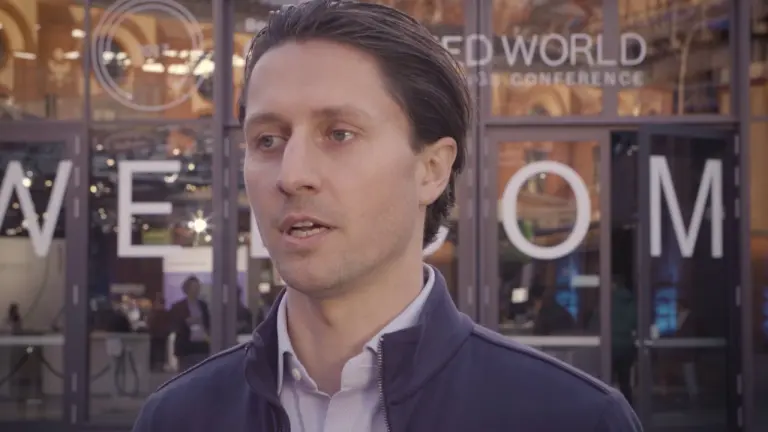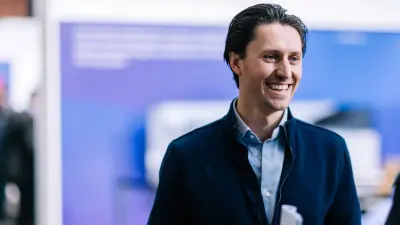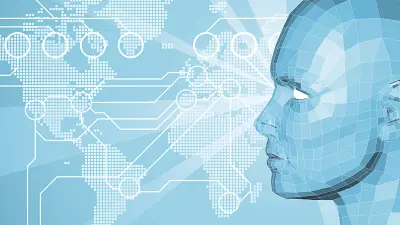“Human judgement will always differentiate us from machines”
In dialogue with the partner of IBM Ventures

Computers that know our preferences? That complement our abilities and skills? What sounds like science fiction is happening right now and will radically change how humans and technology communicate — for the better, says Christoph Auer-Welsbach, partner, IBM Ventures.
An interview with the IoT expert Christoph Auer-Welsbach

Loading the video requires your consent. If you agree by clicking on the Play icon, the video will load and data will be transmitted to Google as well as information will be accessed and stored by Google on your device. Google may be able to link these data or information with existing data.
“There will always be a partnership between humans and machines.”
Artificial intelligence won’t replace people
For Christoph Auer-Welsbach, partner, IBM Ventures, interaction between humans and machines is nothing new: “Think of chess — here people have been playing against computers for years.” He sees artificial intelligence (AI) not as a danger, but as a valuable way of rounding out human abilities. “Computers will not be superior to us,” Auer-Welsbach says. In many professions, however, AI can make people’s everyday work easier. Take jobs in the healthcare sector, for instance: “To stay up to date on the state of all patients or all medical developments at all times, a doctor would have to spend 160 hours a week reading. And doctors just don’t have that kind of time.” AI can do it for them. But this knowledge is only of use if there is an interface between doctor and machine: “Which is why systems that process this massive amount of information for doctors are important. That way, they have more time for patients and make fewer mistakes.”
According to Auer-Welsbach, AI will also take on a crucial role in other areas, such as the public sector or heavy industry: “Artificial intelligence will have an influence on companies’ production processes and on fields in which customers come into contact with automated services.”
“I saw a manufacturing robot turned into a 3D printer. The robot needed 72 hours to create an architectural model — humans need three to four weeks.”
Machines are capable of learning
A young technology company has reprogrammed a normal industrial robot to transform it into a 3D printer. The completely new, highly complex function was made possible by machine learning and computer vision. Auer-Welsbach cites this example to illustrate that we need to rethink what we know: “So far, we only use computers the way they have been programmed — and that’s it. But machines are capable of learning.” AI not only helps save time, but also improves the quality of products and processes. “Computer vision simply works better than standard software,” Auer-Welsbach says. In the future, AI will also be capable of adapting to our personalities and abilities, as well as individual physical traits, and acting accordingly.
“I don’t want to have 20 bots on my mobile phone in order to manage my travel.”
People have the final word
Christoph Auer-Welsbach stresses that the relationship between humans and machines will not be the only thing to change fundamentally: “Communication between machines — bot-to-bot communication, if you will — is growing more and more important.” Instead of countless smartphone apps, Auer-Welsbach would like to see a single bot that communicates with other systems. Machine-to-machine communication will allow it to provide support for travel planning and offer suggestions, for example: “I, the human, will still decide what I ultimately do. In the future, human judgment will be the main, vital difference between artificial and human intelligence.” Machines will provide services, not make decisions — giving people the final word.
Christoph Auer-Welsbach, partner, IBM Ventures

A man of many talents: He is a founder, investor, product manager, and in-demand speaker on topics such as artificial intelligence, blockchain, infrastructure, cloud computing, and the internet of things. Christoph Auer-Welsbach also advises a number of start-ups. He studied business and law at the University of Klagenfurt (Austria) and holds an MBA.
Summary
Christoph Auer-Welsbach, partner, IBM Ventures, sees artificial intelligence (AI) as a valuable way of rounding out human abilities. The way we communicate with machines — and the way machines communicate with each other — is set to change fundamentally. Computers are capable of learning and being used for completely different tasks than initially envisioned.

